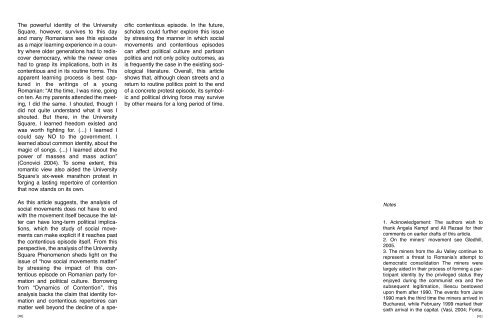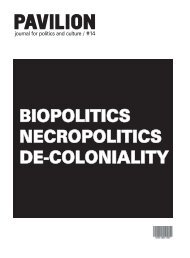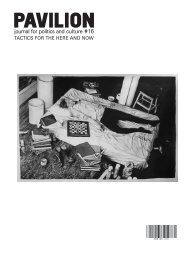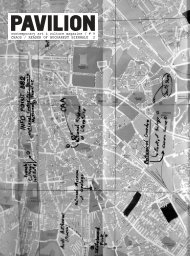PAVILION
PAVILION
PAVILION
- No tags were found...
You also want an ePaper? Increase the reach of your titles
YUMPU automatically turns print PDFs into web optimized ePapers that Google loves.
The powerful identity of the University<br />
Square, however, survives to this day<br />
and many Romanians see this episode<br />
as a major learning experience in a country<br />
where older generations had to rediscover<br />
democracy, while the newer ones<br />
had to grasp its implications, both in its<br />
contentious and in its routine forms. This<br />
apparent learning process is best captured<br />
in the writings of a young<br />
Romanian: “At the time, I was nine, going<br />
on ten. As my parents attended the meeting,<br />
I did the same. I shouted, though I<br />
did not quite understand what it was I<br />
shouted. But there, in the University<br />
Square, I learned freedom existed and<br />
was worth fighting for. (...) I learned I<br />
could say NO to the government. I<br />
learned about common identity, about the<br />
magic of songs. (...) I learned about the<br />
power of masses and mass action”<br />
(Conovici 2004). To some extent, this<br />
romantic view also aided the University<br />
Square’s six-week marathon protest in<br />
forging a lasting repertoire of contention<br />
that now stands on its own.<br />
As this article suggests, the analysis of<br />
social movements does not have to end<br />
with the movement itself because the latter<br />
can have long-term political implications,<br />
which the study of social movements<br />
can make explicit if it reaches past<br />
the contentious episode itself. From this<br />
perspective, the analysis of the University<br />
Square Phenomenon sheds light on the<br />
issue of “how social movements matter”<br />
by stressing the impact of this contentious<br />
episode on Romanian party formation<br />
and political culture. Borrowing<br />
from “Dynamics of Contention”, this<br />
analysis backs the claim that identity formation<br />
and contentious repertoires can<br />
matter well beyond the decline of a specific<br />
contentious episode. In the future,<br />
scholars could further explore this issue<br />
by stressing the manner in which social<br />
movements and contentious episodes<br />
can affect political culture and partisan<br />
politics and not only policy outcomes, as<br />
is frequently the case in the existing sociological<br />
literature. Overall, this article<br />
shows that, although clean streets and a<br />
return to routine politics point to the end<br />
of a concrete protest episode, its symbolic<br />
and political driving force may survive<br />
by other means for a long period of time.<br />
[40]<br />
Notes<br />
1. Acknowledgement: The authors wish to<br />
thank Angela Kempf and Ali Rezaei for their<br />
comments on earlier drafts of this article.<br />
2. On the miners’ movement see Gledhill,<br />
2005.<br />
3. The miners from the Jiu Valley continue to<br />
represent a threat to Romania’s attempt to<br />
democratic consolidation The miners were<br />
largely aided in their process of forming a participant<br />
identity by the privileged status they<br />
enjoyed during the communist era and the<br />
subsequent legitimation, Iliescu bestowed<br />
upon them after 1990. The events from June<br />
1990 mark the third time the miners arrived in<br />
Bucharest, while February 1999 marked their<br />
sixth arrival in the capital. (Vasi, 2004; Fonta,<br />
[41]








